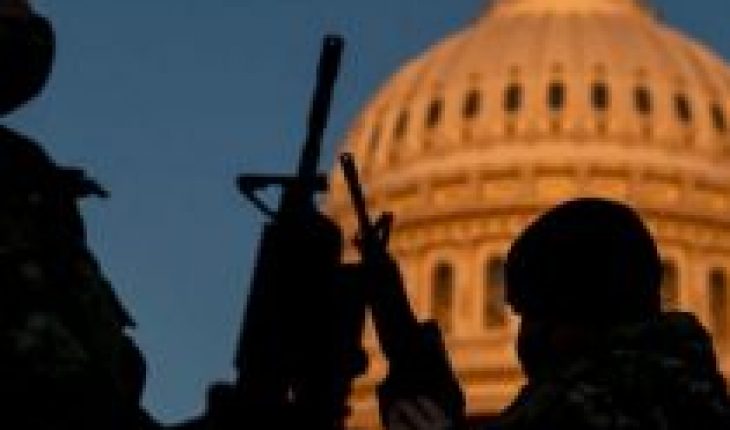
One of the sacred principles of American democracy is that the Army is apolitical and loyal only to the Constitution.
But in the face of political tension generated by Donald Trump’s invasion of the Capitol, military leaders have deemed it necessary to make a reminder.
“The violent protest in Washington, D.C. on January 6 was a direct assault on Congress, the Capitol building and our constitutional process,” says a circular addressed to members of the Army and signed by the seven generals and the admiral who make up the Joint General Staff.
“Any act against the constitutional process does not only undermine our traditions, values and oath; it also goes against the law,” adds the note, published on Tuesday.
Analysts say this is an unusual message from the leaders of the military branches of the Army, although it is part of this climate of tension that the country lives on.
“We are living in an exceptional moment and this is a test,” he tells BBC World retired Major General Dana Pittard.
“Our republic is going through a dangerous moment. What the Joint General Staff says is not exceptional: it basically repeats its oath to the Constitution,” he tells BBC World Peter Feaver, professor of political science at Duke University and expert in Defense.
“But what is exceptional is that they feel the need to say it and that the troops need to be reminded“, adds the author of the book “Armed Servants: Agency, Oversight, and Civil-Military Relations” (Armed public servants: action, supervision and civic-military relations”).
The National Guard guarded Congress Wednesday during the impeachment to Donald Trump. GETTY IMAGES.
Thousands of Trump supporters invaded Congress on January 6 at the time the Trump of Joe Biden presidential elections on November 3.
The assault by citizens who believe – as Trump argues – that there was fraud in the election led to the deaths of five people.
This Wednesday Trump, who will cede power on January 20, became the first president in U.S. history to be subjected to a second impeachment.
In the latter process he is accused of “incitement to insurrection”.
Broken silence
A week after the events, the Army broke its silence.
The acting Secretary of Defense, Chris Miller, had already condemned the assault last week, but the head of the Joint Chiefs of Staff, General Mark Milley, I hadn’t spoken yet.
And, according to the Reuters agency, he hadn’t because he wanted to stay away from politics. According to local media, many soldiers had privately expressed concern about the lack of direction behind what many see as an attack on democracy.
Mark Milley is the head of the Joint Chiefs of Staff. Reuters
Milley’s silence contrasted with his presence on a walk with Trump in June last year after the National Guard and police officers dispersed a group of peaceful protesters near the White House protesting the death of African-American George Floyd.
Now, with the Army back in the crosshairs after the assault on the Capitol, Milley and the rest of the military top commands considered it key to make a reminder a few days after Biden assumes as his commander-in-chief.
“The right to freedom of expression and assembly does not give anyone the (right) to resort to violence, sedition and insurrection,” says tuesday’s circular.
The Pentagon is working with the FBI to see if active members of the Army are among the Capitol raiders, and also to find out if any of the 10,000 National Guard troops who will bolster Biden’s inauguration on the 20th require further investigation.
“The Army is a reflection of the society it serves and that’s why there are different beliefs. And we have to make sure there aren’t people out there who want to overthrow our government,” says retired Major General Dana Pittard.
Who is the Joint General Staff talking to?
According to Pittard, the circular has a double recipient: troops and the general public.
“Internally I’m sure there are people who can somehow sympathize with the insurrection. It will be a minority, of course, but the circular makes it clear that it is unacceptable,” says the ex-military, who admits that this can be troubling.
This Thursday it was reported that groups of armed extremists aim to take possession of Biden next week.
“And externally, people want to know that our tradition, which has worked so well, is that the Army can’t be used as an internal political weapon, it can’t take sides,” he adds.
“Obviously there is a concern that people have not fully understood the role of the Army.”
Members of the National Guard rest within Congress during the day on which President Donald Trump was voted impeachment. GETTY IMAGES
“The Army must not allegiance to an individual, and it must be emphasized again. That’s why the General Staff published that letter,” Pittard says.
Richard K. Betts, director of the Columbia University Saltzman Institute for War and Peace Studies, matches Pittard, but adds one more recipient: the president.
“It’s a signal to Trump not to abuse the Constitution by putting the Army on his side in an illegitimate attempt to overturn the presidential election,” Betts tells BBC World.
A tense relationship
During the Trump administration there have been times when the traditional political neutrality of uniforms, something Pittard defines as a “sacred value,” has been under great pressure.
“President Trump unsuccessfully tried to get the Army loyal to him rather than the Constitution. Many other populist and authoritarian leaders in the world have tried. But the U.S. Army has resisted,” Feaver says.
Perhaps the highest-tensioning moment was when Trump had the National Guard participate in the security device against the anti-racism protests that sparked the death of African-American George Floyd.
Floyd died while being violently detained by white policemen.
The president then cried out for the end of the protests he linked to the “radical left.”
In that context came Trump’s walk with Milley, dressed in a campaign uniform, to take a picture in front of a church that had been vandalized during protests near the White House.
Mark Milley (left) apologized for his presence on Trump’s controversial walk amid protests over racism last year. GETTY IMAGES.
That happened after weeks of questions from some military over the way Trump had responded to protests with the deployment of the National Guard.
Milley’s presence alongside Trump, the Army’s highest-ranking officer, was seen as if senior officials validate Trump’s management of the protests.
The military chief admitted after he had made a mistake.
“I shouldn’t have been there. My presence at the time and in that environment created a perception of the military involved in domestic politics,” he said.
At the time, the president even intended to invoke the Insurrection Act of 1807 to deploy active-duty troops across the country to quell the protests, a line several U.S. military said they would not cross.
Donald Trump has at times maintained tension with the Army. GETTY IMAGES
Military and above all ex-military then reacted, as now, to remember the Military’s fidelity only to the Constitution, not to a party or to a president.
“The principle that the Army is loyal to the Constitution and that it is never involved in politics has been fortified over time by the stability of our political institutions,” Professor Betts told BBC World.
“That stability has been shaken in the Trump era, but it hasn’t broken,” she adds.
“At the beginning of his presidency he thought the Army generals were his employees and he had to be regularly reminded that the American system does not work that way.”





